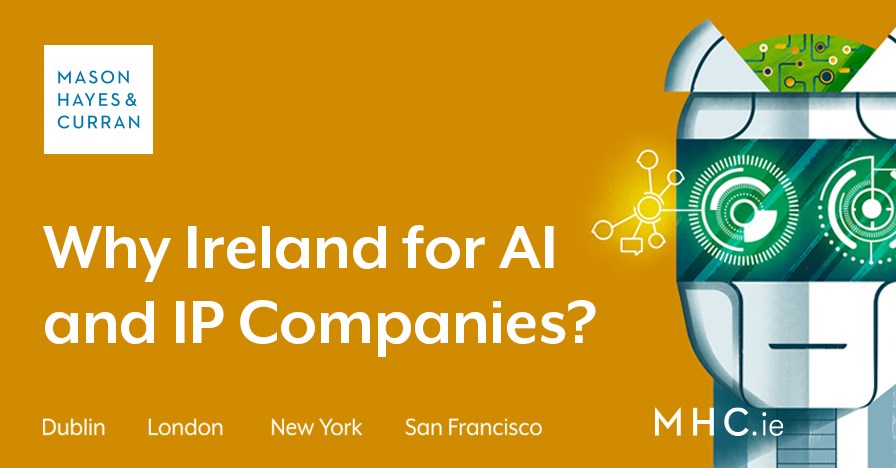
Ireland is a very attractive location for AI and other IP rich companies seeking a European hub for developing, managing and exploiting intellectual property rights globally. Ireland provides a competitive business platform and tax regime for business operations which locate the required functions, risks and assets in Ireland in line with the requirements of the OECD BEPS project.
According to the IDA:
-
Orreco & IBM built the world’s first cognitive solution for sports in Ireland that helps athletes predict injury risk and readiness to perform
-
Ireland holds leading positions in EurAI and per capita has the highest number of EurAI fellows
-
Ireland is the first country in the world to develop an industry driven nationwide Postgraduate MSc in Artificial Intelligence
-
Many companies use Ireland’s numerous testbeds to trial and prove technology and business solutions. In the autonomous vehicles sector alone Valeo and Jaguar Land Rover have invested millions of euro in AV testing in the West of Ireland.
12.5% & 6.25% Corporate Tax Regimes
The key tax benefits of Ireland include an EU approved low rate of corporation tax 12.5% for trading operations managing, developing and exploiting IP in Ireland. In addition, Ireland has an OECD approved “Knowledge Development Box” regime which applies to research and development (R&D) operations carried on in Ireland and the EU. Where this R&D work leads to the development of IP assets including patented inventions, copyrighted software, and other rights related to medicinal products, plant breeder rights, and for certain small companies unregistered certified patent rights, a reduced rate of 6.25% may apply to related income. This regime is to be extended for a further two years to the end of 2022 per the Finance Bill 2020.
The regime adopts a modified nexus approach which means that the benefit is linked to the amount of qualifying R&D carried out by the company claiming the relief. Ireland’s regime is more favourable than other countries some of which are limited to patented inventions, such as in the UK and Switzerland. The inclusion of copyrighted software in Ireland’s regime is particularly interesting for companies engaged in developing and using AI technologies.
Tax allowances for Intangible Assets
Ireland provides generous tax write-offs in the form of tax depreciation allowances, known as “Capital Allowances” for expenditure incurred on acquiring IP from group companies or third parties. This allows companies to invest in new technologies and/or migrate existing IP to Ireland tax efficiently. These allowances may be claimed in respect of a very broad range of qualifying intangibles, including patents, trademarks, brands, know-how, trade secrets, secret processes and other intangibles such as externally acquired goodwill related to IP rights and customer lists in certain circumstances.
These write-offs may be claimed at a rate in line with the accounting treatment or at a rate of 7% for years 1 to 14 and 2% in year 15. The allowances may be offset against trading income derived from managing, exploiting and developing the rights and from the sale of goods and services deriving the greater part of their value from the use of those rights. The deductions available are limited to 80% of the relevant trading income for the accounting period. Interest payable on loans used to fund the acquisition or due to group companies on the acquisition of qualifying intangibles is also tax deductible, subject to certain limits and rules.
Special 25% Tax Credit for R&D Expenditure
Ireland also offers a valuable 25% tax credit for R&D expenditure carried on within Ireland and/or in the EU/EEA. This relief, combined with the normal business deduction for R&D expenditure, can bring the effective tax rate of the company well below 12.5%. Expenditure for these purposes includes expenditure on plant, equipment and buildings. Qualifying R&D activities include activities which involve systemic, investigative or experimental activities in the fields of science or technology and involve basic research, applied research and / or experimental development. The tax credit can be claimed in respect of group expenditure on R&D or expenditure on outsourced R&D activities to third parties and universities in the EU/ EEA, up to certain monetary limits. The 25% tax credit can be utilised to reduce tax payable at the corporate level or to incentivise key employees in a tax efficient manner.
Other Tax Advantages
Generally speaking, royalties can be paid to non-Irish residents free from Irish withholding tax for most IP rights other than certain patent rights. Payments in respect of patent royalties may be paid free of Irish withholding tax to EU or double tax treaty residents and in the case of non-Irish patent rights, to all non- residents where certain conditions are met. Ireland also operates an attractive tax credit system in respect of any foreign withholding tax suffered by an Irish operation on receipt of royalty income and in relation to other income streams.
Ireland also applies special tax relief for key executives seconded to work in Ireland for up to a 5 year period. This allows companies seeking to migrate operations to Ireland to leverage off some of their existing talent pool. This relief known as “Special Assignee Relief Program” reduces the amount of income tax payable by those executives by up to 30%.
Yes to Ireland for AI & IP!
Ireland has a very favourable tax regime for companies engaged in managing, developing and exploiting IP and advanced technologies such as AI. It also offers an excellent regime and supports for carrying out R&D activities and an attractive system for rewarding key employees engaged in those developments and seconded to work here. The presence of the world’s leading AI, Technology, Pharma, Life Sciences, Healthcare, Fintech and Social Media companies in Ireland is testament to the attractiveness of this regime.
For more information and expert guidance in all related matters, contact a member of our Tax or Intellectual Property team.
The content of this article is provided for information purposes only and does not constitute legal or other advice.




